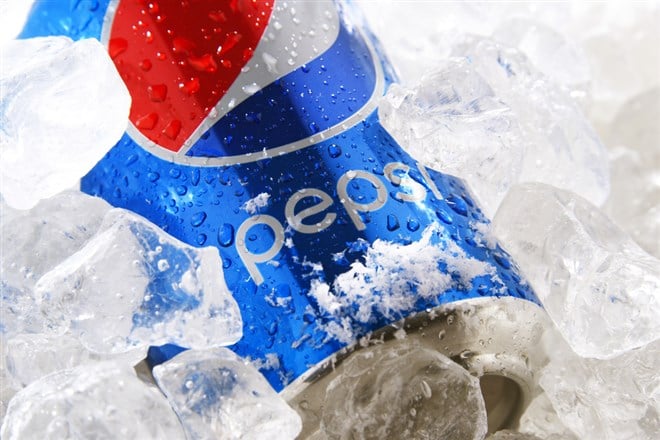重要的人不是“不切实际”Pepsi's New Soda?Pepsi introduced a new lemon-lime beverage, "Starry" to somewhat poor reception, but that does not seem to affect long-term growth.
ByKeala Milles•
This story originally appeared onMarketBeat


PepsiCo, Inc (NYSE: PEP)may be a popular soda company, but they have had trouble developing a winning lemon-lime product to compete with industry leader, Sprite. Distributed byThe Coca-Cola Company (NYSE: KO), Sprite has led the industry since its introduction in 1961, and it appears that Pepsi's latest attempt—a vibrant new drink called "Starry"—is not stirring the market the way Pepsi had hoped.
What is "Starry"?
Starry is a caffeine-free soda with"higher citrus flavors that are true to the fruit and more aromatic"than Pepsi's previous lemon-lime soda, Sierra Mist. It will launch also launch with a sugar-free version. Accordingly, PepsiCo Beverages North America vice president of R&D, Danielle Barbaro, has commented, "With Starry, we were able to create a game-changing recipe with the perfect balance of lemon-lime flavor and sweetness compared to the competition."
Unfortunately, analysts do not appear to be as excited as the higher-ups at PepsiCo. While its current share price (hovering around $175) is in the top third of the 52-week range, news of Starry's launch does not seem to be contributing.
Share value is down -4.29% on the month. The lack of investor support for "Starry" becomes a little clear when comparing the 30-day dip against overall growth over the last3- and 12 months (+7.34% and +3.35%, respectively),which was much better.
Why Has Pepsi Introduced "Starry"?
According to data fromStatista.com, Coca-Cola commands about 46% of the carbonated beverage market, with PepsiCo trailing at about 25%, followed byKeurig Dr. Pepper (NASDAQ: KDP)at 21%. The remaining 6% is attributed to all other brands, including those sparkling water companies that have been growing in popularity over the last ten years.
Considering the company's struggle to overtake the overall cola and soda market, capturing the growing lemon-lime soda segment could be a smart long-term strategy.
After all, this isn't the first time Pepsi has tried to overtake Coke's carbonated lemon-lime domination. While the cola brand still distributes 7up internationally, that particular lemon-lime soda is owned (and distributed in the US) by Keurig Dr Pepper. Pepsi's first major attempt at a direct competitor to Sprite was, in fact, Sierra Mist.
Unfortunately, in all of its 24 years, Sierra Mist barely managed to conquer one-tenth a percent (1/10%) of its market sector, according to Beverage Digest (as reported by CNN).
On top of that, Sierra Mist sales have significantly declined over the past five years, even though "demand for lemon-lime flavored soda has never been greater," as described in a company statement. By comparison, Sprite has grown its soda market share by nearly 8% over the same period.
This is in line with Coca-Cola's numbers from 2021, when Sprite carried about 8.3% of the beverage market, bringing in $6 billion in annual sales.
How Does Starry's Lackluster Acceptance Affect Pepsi's Overall Growth?
Short answer: it does not appear to affect Pepsi's outlook. In terms of [long-term] growth, Pepsi has been mostly consistent across its stock exchange(s) history.They first listed at Loft, Inc. on December 18, 1919, roughly 20 years after the company was formed. But regardless of its name or how long they've been on the market, PEP has maintained growth, even as the stock experienced great dynamics in recent decades.
The good news is that PEP consistently rebounds after every dip. They persistently bounce back and shoot past the previous high whenever PEP has a down session. This means that every time Pepsi stock has slipped, it has led to more growth, and there is no reason to believe this trend will not continue.
After all, even though Sierra Mist has struggled for the last two and a half decades, Pepsi always managed to find a way back.
Historical Data Hints At PEP's Long-Term Strength
For example, the share price on March 3, 2022, sank from $165.75 to $153.73 within a week, then bounced back to $177.50 by April 2022. The stock wavered up and down again several times before finally hitting a new historical high of $180.22 on August 16.
After another quick dip, the stock hit the 52-week and new historical high of $186.84 in December. Shares have slipped a bit since then, butthere is no reason to believe that PEP will stay down for long.
And with abeta value of 0.59, Pepsi may be doing better than the public sentiment suggests. Furthermore, a24.07 P/Eand a 2.62% dividend yield—at a value of $4.60—appear to raise the overall health of PEP in the long term, despite the current stumble. So while the news of "Starry" has not been heavenly, the unceremonious response may not drag the stock's future. It appears the move might not affect it all.











